My father died on November 30th. He had been ill for five years, with one of the exotic derivatives of leukaemia that can be emolliated for a time, but will triumph in the end. We were very lucky that the care, for him and us, during his illness, was wonderful. He was treated in a well-funded Macmillan Centre in a large NHS hospital whose excellent condition is due, no doubt, to it being in a Tory semi-marginal constituency. He died there, with an attentive palliative care team staffed by nurses and a consultant he had come to know and who treated him as a friend. Everyone should have such care.
My mother and I were with him when he died. He’d been unconscious for a couple of days, stretched on a bed that was almost too short for him, his head and shoulders raised, his mouth open, a tube in his nose quietly hissing oxygen into him. Every few hours, his painkillers would begin to wear off, and he would rise towards awareness, wave his hands feebly and move his jaw. I was thrown into panic by this activity, pestering the nurses, or trying to dab at his mouth with a wetted sponge, making useless attempts to comfort him.
My sister, Charlotte, my mother and I stayed in the room overnight the night before. They slept on chairs and I had a pillow on the floor, and, horrible as the situation was, we were close in a way I don’t remember us being for many years. He was a missing part, just a bodily presence, although we spoke to him, telling him we loved him very much. In one of his periods of stirring, Charlotte said, “We are so lucky to have you as our father,” and I wept silently, so as not to upset him. In the small hours of the morning, with just my mother and me in the room with my father, Charlotte having popped home for a few hours’ rest, I noticed that he wasn’t breathing any more. It was that simple. After a controlled bedlam of nurses checking we were right, I closed his mouth, and a nurse switched off the oxygen, and my mother and I sat in silence with his body.
“I wish I could cry,” she said.
Over the rest of the weekend, we clung together, my mother, my sister, Amanda, our friends Vanessa and Pete, my niece and nephew and me, going through photo albums, walking the dogs, and coming to terms with a world without him.
Amanda and I had to return to the Island. I didn’t want to take too much time off work, as I had learners coming up to exams, and they needed my support. We returned to Bury St Edmunds the following weekend, though, and took part in the preparations for the funeral. Then we came home for another week, before the long drive back up to Suffolk for the weekend of the funeral, which was scheduled for that Monday.
Our car had developed a fault, which we had had fixed on the Island, but which had left the computerised engine management system messed up. On the Saturday morning, in bright, sharply cold sunshine, Amanda and I drove up to the Peugeot garage on the Morton Hall estate, and booked the car in. It was so cold that we stopped in a pet superstore place and bought Tia a coat, because we were worried she would be too cold on the walk back to my parents’ house. Then we ambled back through the leafy estate, letting Tia roam on a long lead, the grief of our loss a gentle topic of careful discussion, but feeling peaceful in the glorious winter weather.
Back at the house, my mother was worrying about my father’s office. He had kept the most bizarre things: hundreds of old coins; documents without any filing system; cuttings from newspapers about people we didn’t know, and instruction booklets for devices we had never come across. We’d spent the previous Saturday trying to make some sense of it, and Charlotte had dug out all the documents she needed for the registration of his death, and for the other annoyances of bereavement, like re-registering the car in my mother’s name, transferring the joint bank account to her and adding his investments to the estate, so that his will could be processed. Amanda and I spent an hour with her, in the office, trying to calm her nervous rummaging, and prevent her from messing up what order Charlotte had been able to impose.
We were rescued by Charlotte phoning to ask whether we wanted to go for lunch in town. The day remained bright and lovely and we leapt at the distraction.
While I searched for gloves and changed my shirt, I heard a commotion downstairs. My mother had accidentally let Tia out of the front door and she had done one of her disappearing acts. By the time I’d got my boots on, Amanda had already gone out of sight, chasing after her.
I ran across the square and through the alleyway that leads from the new estate where my parents’ house is, onto the industrial estate behind it. The A14, the major road through East Anglia, runs past the estate, on a raised bank with wooded sides about ten metres high. Because of the trees, and the good insulation of the houses, it’s easy to forget it’s there: like all nuisances with which you live, you either get driven mad by it, or zone it out, and I am good at zoning out nuisance.
Over the noise, however, I thought I heard a scream. I was behind a warehouse where I had walked Tia late the previous Sunday, and I ran back round to where I had a view through two industrial buildings to the housing estate. A man in mechanic’s overalls was walking hurriedly across the square. I ran towards the alleyway, but before I got there, through another gap, I saw Amanda carrying Tia and I registered, without absorbing it, that Tia’s head was lolling from her arms.
By the time I got back among the houses, and ran up to the house, Amanda had laid Tia down by the front door and run in, shouting about needing a vet. I knelt down beside the poor, broken dog, and, I think, saw a moment of consciousness before she died. There was blood around her muzzle, her tongue was hanging out and her neck was skewed in a position that said it was definitely broken, but she retained her beauty and her face was still the face I had come to love over the past thirteen months.
I shouted into the house to Amanda, “She’s dead,” and was humiliated to realise I’d wailed it. I buried my face in her fur, and there was no movement. She was warm, but lifeless.
It seemed one thing too many. For a moment, I considered running away. I am a selfish man at heart, and I had been at a high pitch of anxiety since my father’s illness had got worse, months before. For the past two weeks, since his death, I had been promising myself that, at the funeral, I would put this period of unhappiness and tension to rest, and return to sanity, calm and a life of hobbies and good living with a renewed sense of the basic rightness of life. Kneeling in front of my mother’s house, beside our dead dog, that seemed to be a future that I had just lost.
I think, though, that you do find the strength to do what needs to be done, in moments of crisis. My mother was distraught, although, as always, she wasn’t crying, but trying to behave with dignity. I got up and hugged her, and then went upstairs to find Amanda, who was crying on our bed. I comforted her, and cried with her for a moment.
“Our baby’s gone,” she said. I held her tighter for a few minutes, then went downstairs again to my mother.
I phoned Charlotte, and then my mother and I took Tia round the back of the house, through the car park and into the garden. Through my reassurances, my mother took control by trying to organise, and she said that we could bury Tia in the top of the garden. I pushed Tia’s tongue back into her mouth, and arranged her head so that she looked as though she was sleeping, and then I suggested we go inside.
I made tea and Amanda came downstairs. Incredibly, she had managed to compose herself. I loved her so much just then. She had wanted a dog for so long, and when it had finally become realistic, she had worried and fussed over the process, and had been surprised, I think, that it had been a joy, rather than the disaster she had expected, in her anxious approach to life. I knew, though, that she would be thinking about my mother, who was preparing to bury her husband of five decades in two days, and was trying to control the impact of this new calamity, that seemed to confirm her natural pessimism. Two sides of her character – her anxiety and her impulse to care about the feelings of others – were at war, and her selflessness triumphed.
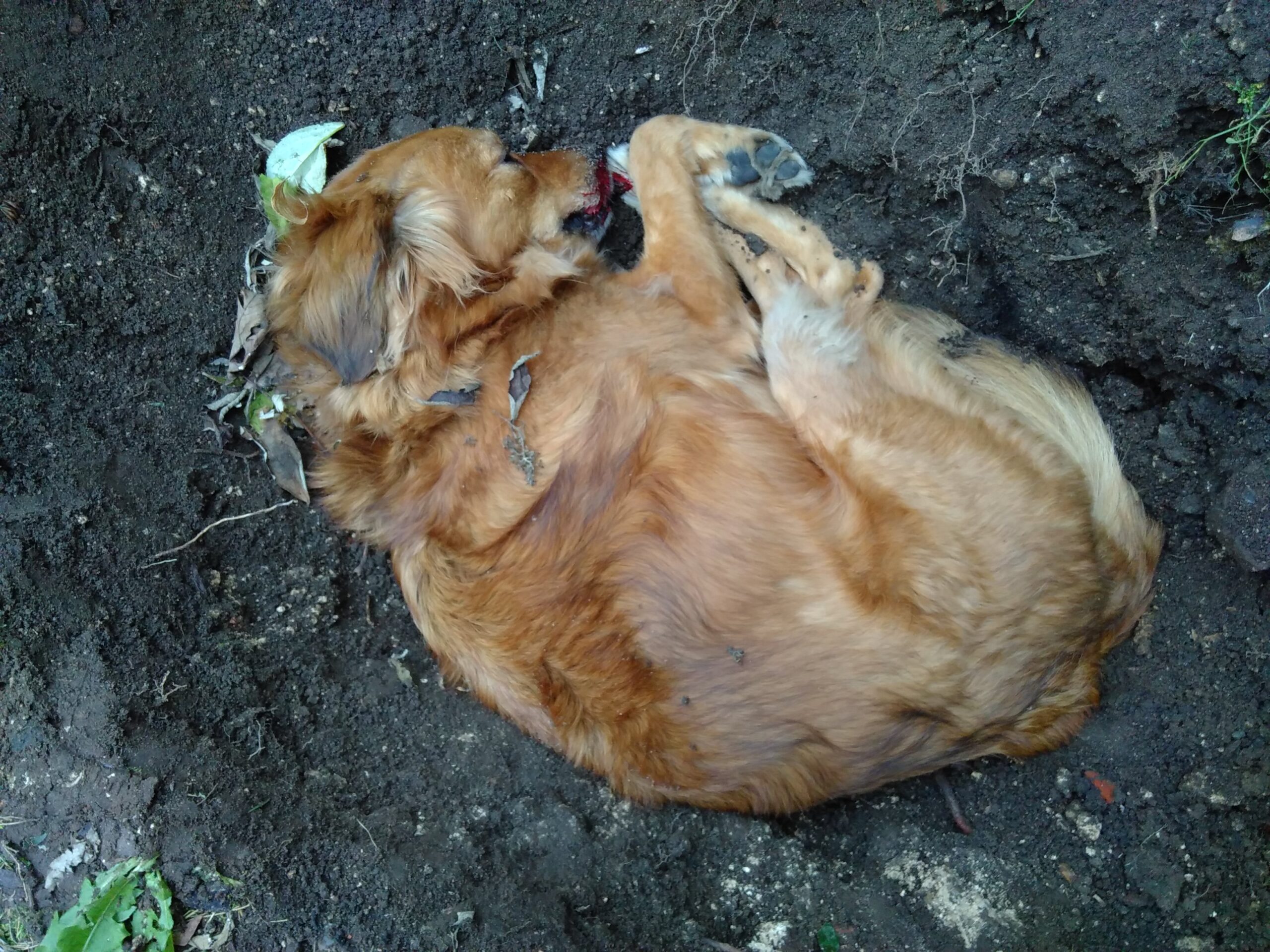
Charlotte arrived. I asked her to stay with Amanda while my mother and I took Tia’s body up to the top of the garden. We got a spade and a shovel from the shed and dug a hole in a patch of ground that my mother had only cleared of weeds that autumn, and which she was planning to use for climbing plants. When it seemed deep enough, I laid Tia into it, arranging her as best I could. When my mother asked me whether I wanted to start filling in, though, I said it could wait for an hour or two. Tia was still warm. “I don’t want those nightmares,” I said.
There didn’t seem anything else to do, so we went ahead with our lunch plans, walking into town. To get out of the estate, we had to pass the path that Tia had bolted up, onto the A14, and Amanda found that hard. She explained what had happened and reproached herself for chasing an excited dog, when she should, she felt, have hung back, waiting for her to come back to her. I doubted that Tia, once she had given way to curiosity, would have noticed, but I didn’t try to contradict her then. The man in overalls I’d seen was a mechanic in the garage by the main road, and Amanda and I dropped in to thank him. He was kind and sympathetic, but embarrassed, and I said to myself then what I would say many times over the next few weeks: she was just a dog.
My father’s funeral was on Monday 17th December, 2018, at half-past-two. If that seems a little histrionic in its precision, my excuse is that such details matter, two months on, as it all begins to feel a little distant.
By the good offices of the church warden, Teresa Goodenough, who is a long-term friend of my mother’s and a true Christian, we had been allowed to hold it in the church of Fornham All Saints, the village in which my parents lived for twenty years, although they had ceased to be parishioners when they moved into town, and transferred their worship to the cathedral, which was more accessible to them as my father grew frailer. Kindness surrounded us in the arrangements. Two friends of my father’s officiated: Canon David Crawley, who is the Anglican chaplain at the hospital where my father died, and Revd. Michael Edge, a neighbour of my parents who is a retired cleric and who used to visit my father at home to read with him and, it seems, chat about memories of the Church of England.
My cousin, Nicky, and her husband, Chris, stayed with us at my mother’s house the night before. They’d travelled up from Devon and the meal we shared on the Sunday evening was a joyous affair, with Charlotte and Eden (my niece) joining us. Later, we got out the photo albums again. I think I may have been obsessing slightly. I had been busy throughout the fortnight since my father’s death, burying myself in Labour Party stuff and trying to shut things out, and I felt now that I needed to throw myself into some role of mourner-in-chief.
In the morning, my uncle and aunt came over from Norwich. Charlotte, Eden and Ruben (my nephew) arrived mid-morning and then Vanessa, Pete and their daughter, Maya, turned up. It was another lovely, bright winter morning. The house was full of flowers and cards and the sense that my father was a man widely loved had begun to seep into my grief.
Charlotte and Amanda had taken my mother dress shopping on the Saturday and had had a proper girls’ day out. The pain of losing Tia was still hanging over Amanda and me, but we had been able to hold it off, at least around my mother; to keep the focus on her.
At the appointed time, the undertakers’ car turned up and Charlotte, my mother, Amanda, Ruben, Eden and I piled in. It was all a bit of a daze. You see funeral processions and you try not to stare, but it’s one of those experiences that can never feel entirely novel when it is finally your turn to sit ashen-faced in the extended Mercedes: it is too familiar as an observer. Our route was by ring roads, round the back of the sugar-beet factory and through Fornham St. Martin, all golf-courses and flat-pack housing estates, and so arriving in the centre of the village, outside the church, was like stepping out of a mundane world and into a picture-book one. Fornham is not what it was when my parents lived there, but it is still beautiful, and the church is like an archetype of a village church.
Going in was a shock, though. It was filled. Teresa was rushing about, organising more seating. In the end, just shy of two hundred people were packed in. My father had been a founding member of the St Edmundsbury Male Voice Choir, and a couple of dozen of them packed the choir stalls. Amanda and I were sat in the front row to the right of the aisle, while the rest of the family sat to the left. I stared up at the East window and prayed to the picture of Christ there.

The vicars and Charlotte had asked me whether I wanted to do a reading. I hadn’t wanted to do a eulogy: how could I sum him up? Chaotic, honourable, loving, daft, pompous, kind, gentle, brave and funny: none of it would have sounded like the stuff of a loving son. It would have sounded like a performance. I had latched on loving, and chosen the only text that came to mind at the time they asked: Paul’s first letter to the Corinthians, chapter 13, on love.2 I’m not actually a huge fan of Paul, but he is very good on love, and it has been the front page of my website for over a year, so I know it. It seemed right.
When the time came for me to read, I got up and walked to the lectern and just kept my head down. Revd. Michael had printed the passage out for me in large print, and I took the sheets out of my pocket, laid them on the lectern-top and read. A sort of grace seemed to fill me. I didn’t rush, or falter, and, when I reached the line saying that love “endures all things,” I looked up, straight at Amanda, willing her to feel the comfort of this truth. She was crying, though, with her head bowed, and so I looked down again, and read on.
On Christmas morning, my mother and I went to the eight o’clock communion in the cathedral. We walked up in frost-sharp air, and took our places in the sparse congregation. It was a beautiful service. The sermon, by the Dean, the Very Revd. Joe Howes, was casual, chatty, included some good jokes at his own expense, but made a wonderful point about, I think, rebirth, although I cannot now clearly remember. It felt as though he had addressed himself to me. By the time we took communion, I was in a real state of prayer; calm and settled, the whirring calculation of my brain stilled.
We walked home through the Abbey Gardens and the sun was white-bright turning to gold on a perfect sheet of frost. In the middle of the gardens, we stopped to look round, and to appreciate the beauty of the morning, and I revelled for a moment in the aftertaste of prayer. Then, my blogging head kicked in and I got out my phone and took a few photos. These are the results.
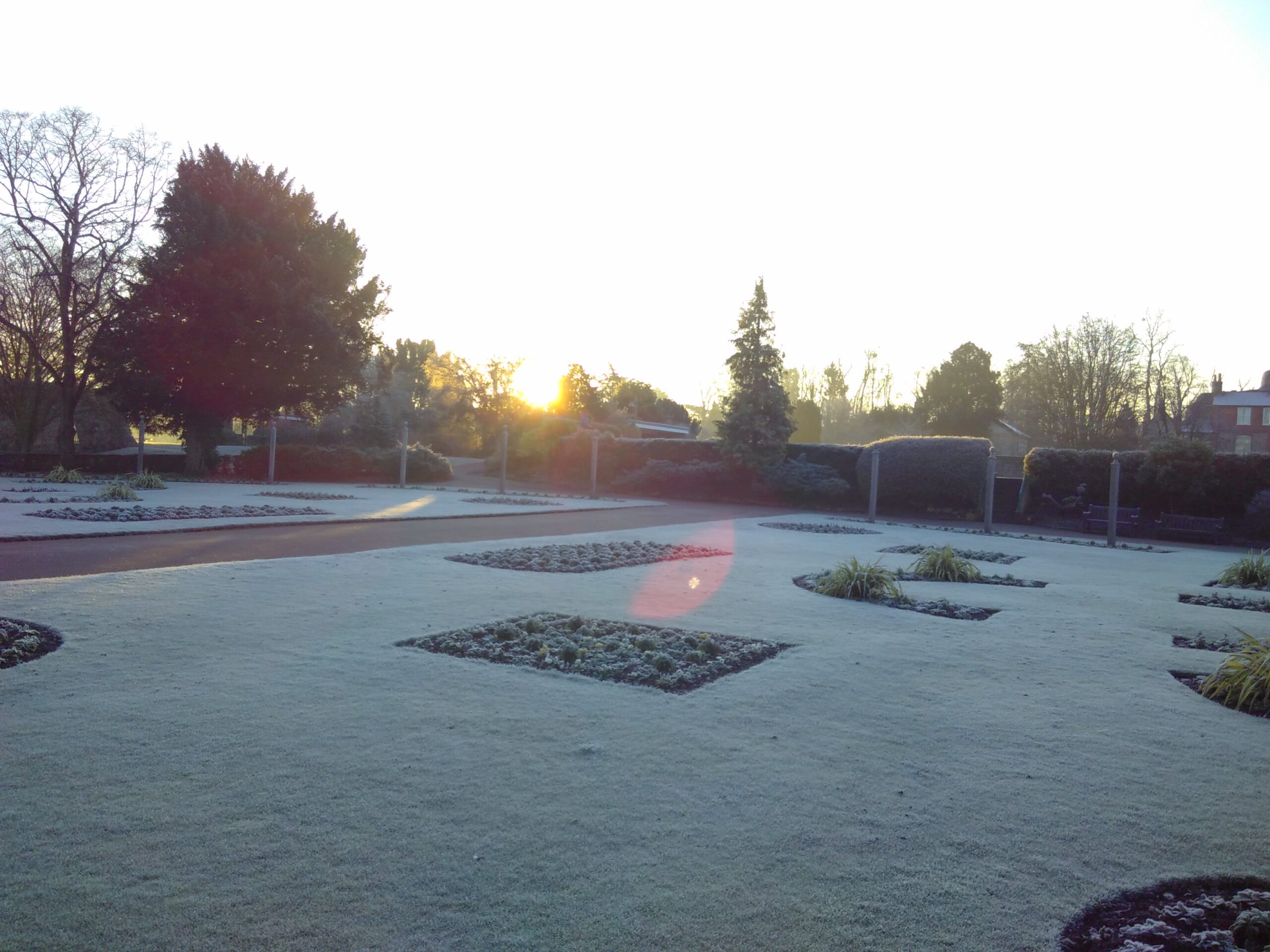
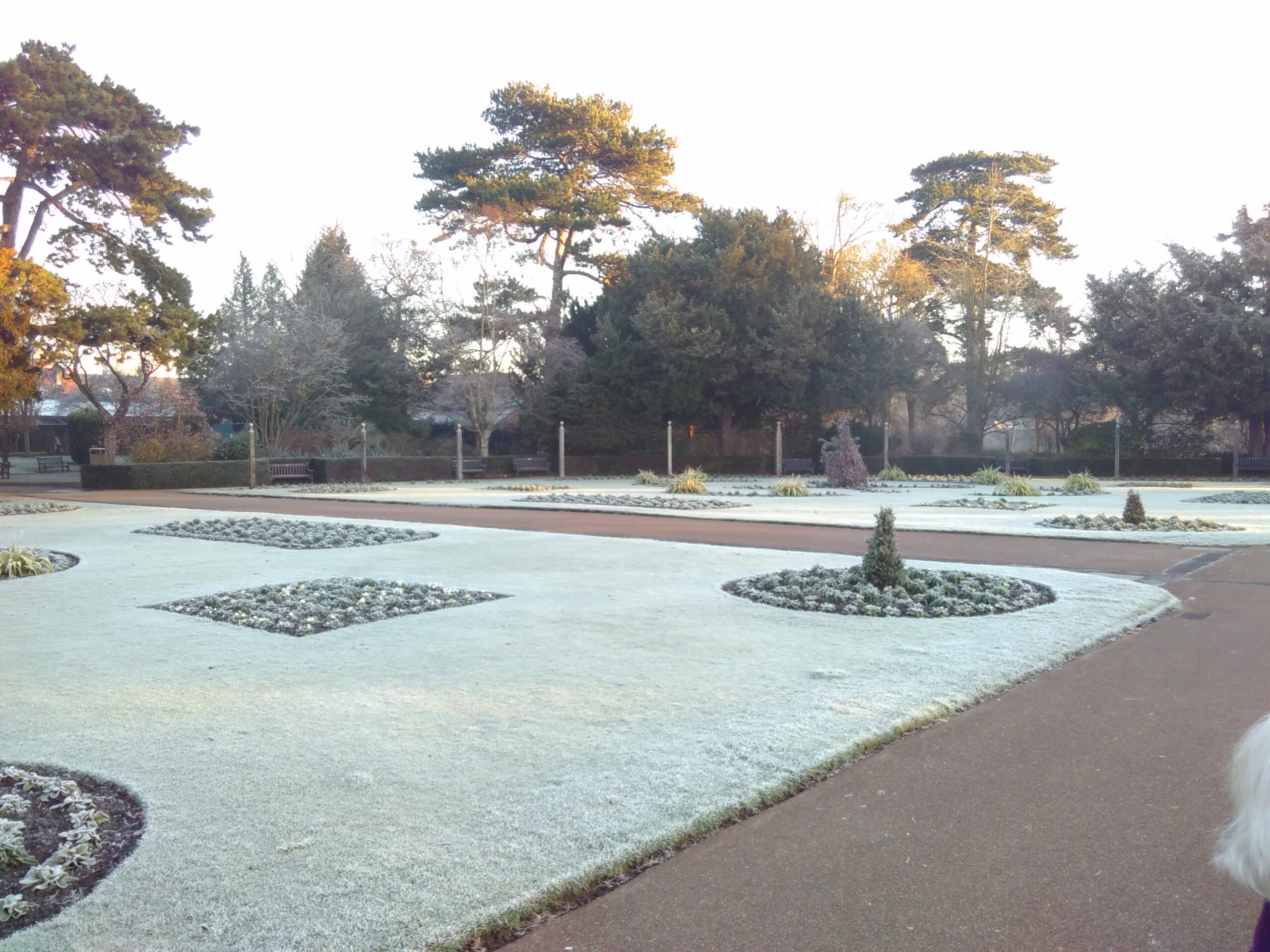
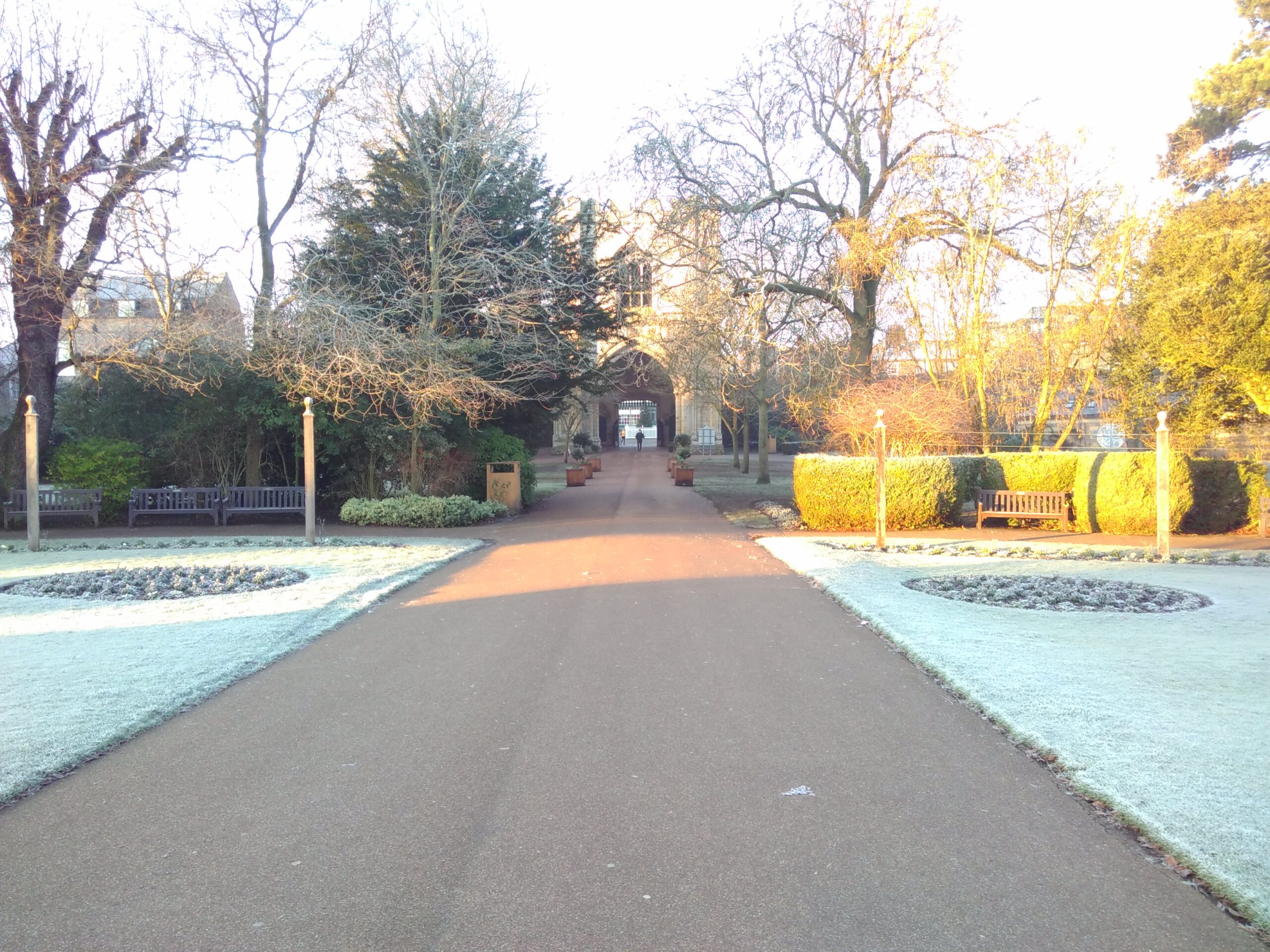
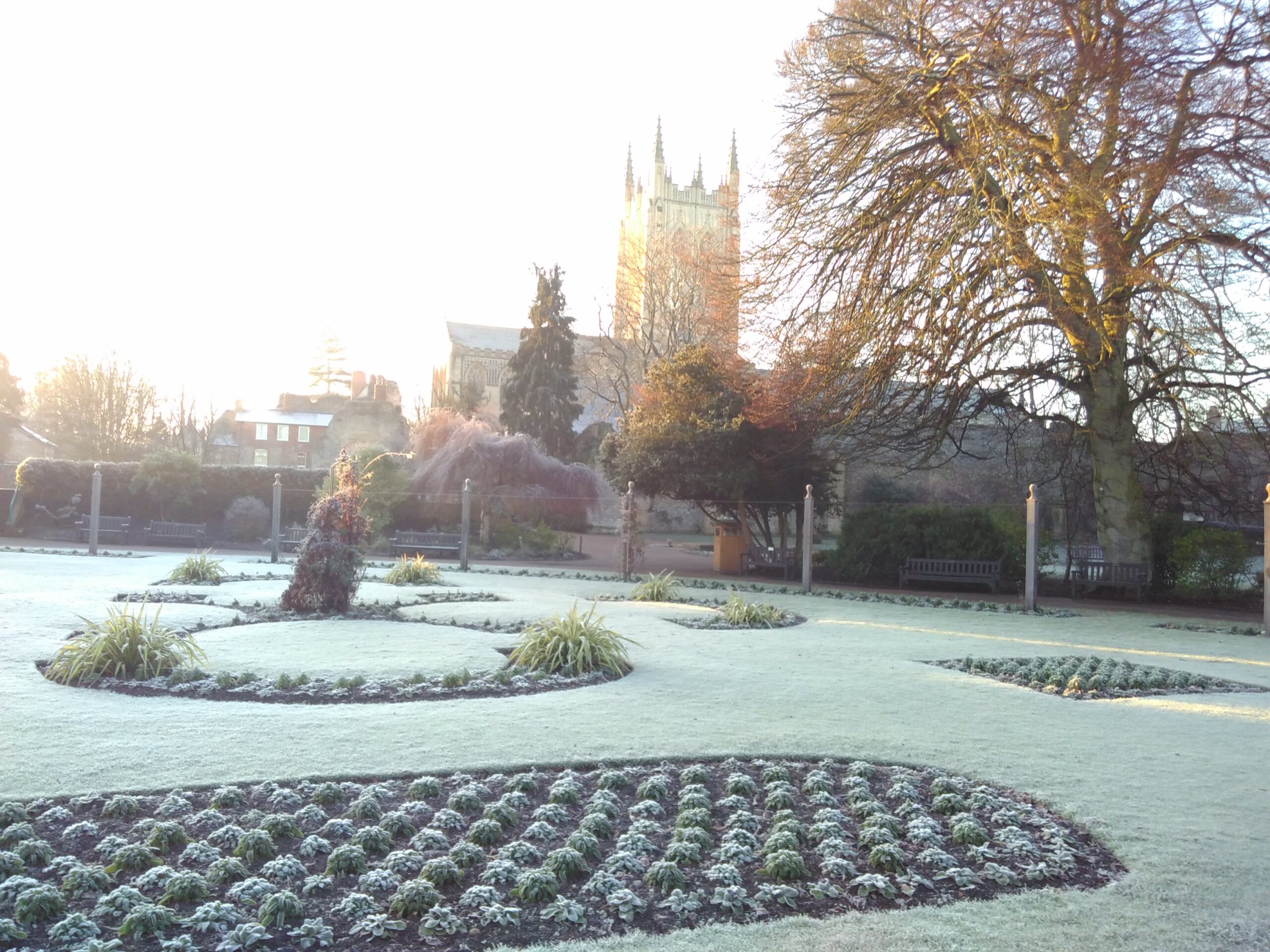
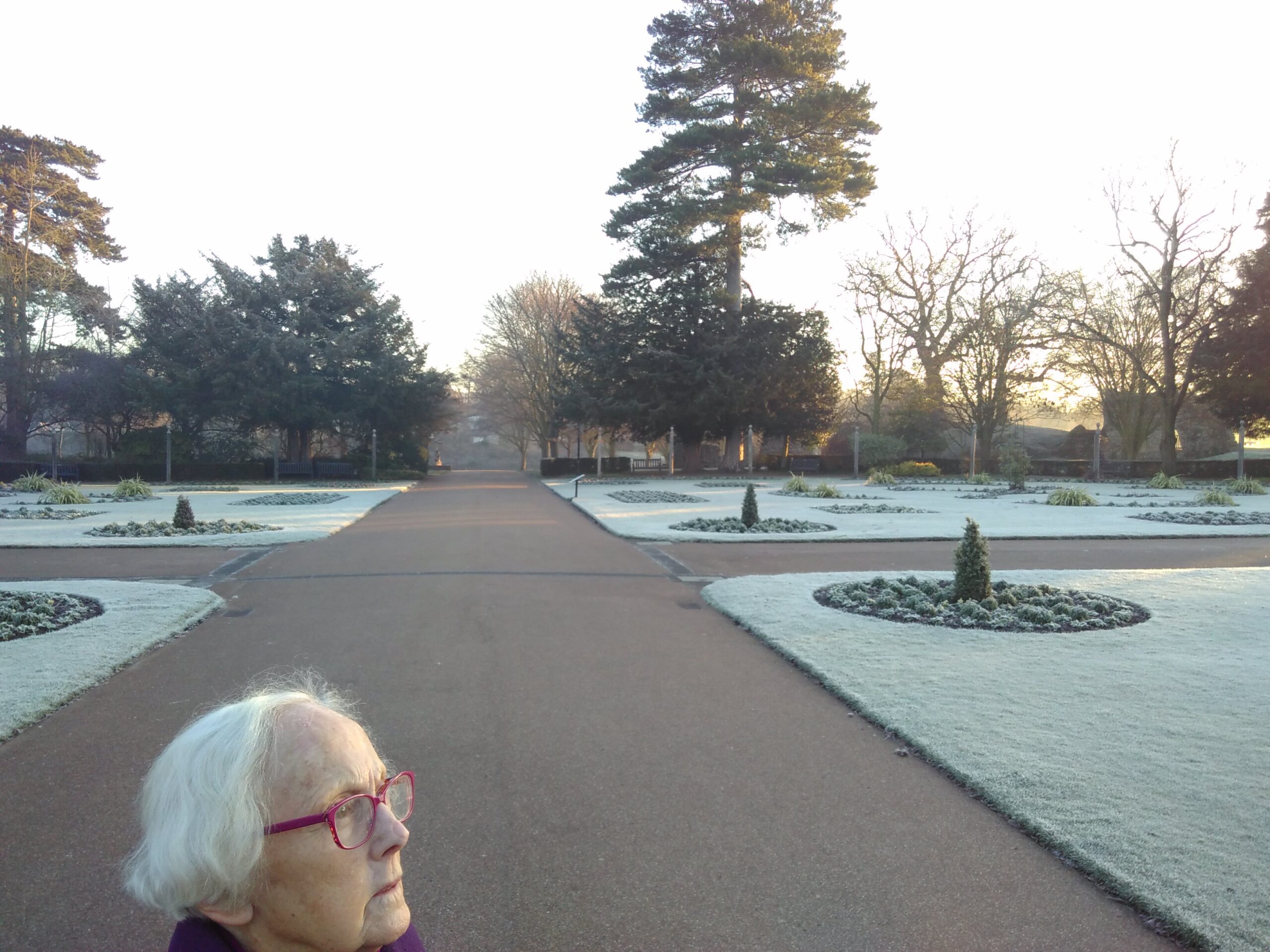
Still, the grief muddled on, the great sorrow of my father’s loss overshadowed by the petty grief for a slaughtered pet. During the previous week, back on the Island, attending training at work now that classes had ended for the term, and filling the rest of my time with computing tasks to keep myself busy, I had become angry about it, and then worried, that I was not grieving appropriately. Nevertheless, we had a happy Christmas day with Charlotte, Eden, Vanessa, Pete and Maya round my mother’s table, doing it all with a sense of duty that, despite the circumstances, turned into joy. At one point on Christmas Day, my mother said to us, “Mike would have loved this,” and that made it feel alright, being happy, so soon.
On Boxing Day, Charlotte had us round to her house for a meal. Eden was there as well; a quiet, amused presence, treating life like a humorous spectacle, as is her manner. At some point, I must have looked around the room, at these four incredible, brave, kind women; my mother, my wife, my sister and my niece, and realised that, despite the double blow I had suffered, my relationships with them had been strengthened, not harmed, by our shared sorrow. In any loss, there is something to be gained, if you can find it, and, for me, this closeness was like a reward for my not having given way to my grief. I hope the same is true for them. I know that Amanda feels our relationship has been strengthened by the last few months’ turmoil, because we can discuss such things, and Charlotte has made cautious overtures to me as well, but I worry about my mother.
I wish she could cry.
I’m still worried that I haven’t grieved properly. I’ve done some research, and discovered that the advice is so consistent that it must be a reliable consensus: there are stages; they are not written in stone; everyone grieves differently. It all begins to sound a little lazy, as if the universality of loss has reduced the incredible unreality of someone you love no longer existing to a set of bullet points on a web page or in a leaflet that gets misfiled in a health centre.
What nags at me is how sharp my feelings towards Tia are, compared to my feelings about my father. She was just a dog. I can rationalise it by realising that, despite my policy of optimism throughout his illness, I had five years to understand that my father would not be with me forever, whereas Tia’s death came out of the blue, when I was already vulnerable. Nevertheless, it feels inappropriate, like a betrayal.
In the months since the funeral, I have returned to work, continued to tinker with computers, attended Labour Party meetings and enjoyed social events. Life goes on. Tomorrow, Amanda is going to the mainland to pick up a puppy, Buttercup (that’ll have to change), from a rescue charity in Hertfordshire. Life is beginning to regain its balance.
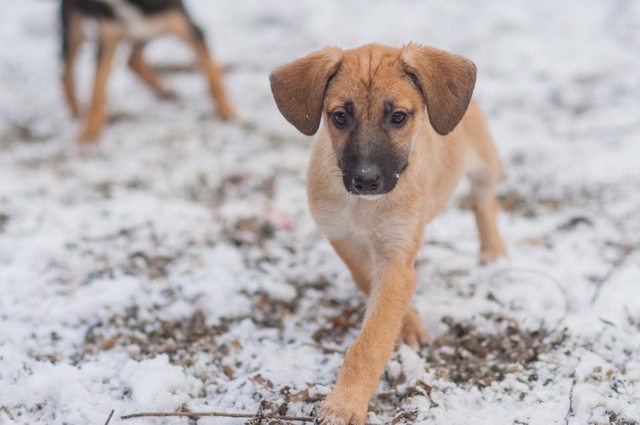
Perhaps, for me, that is how grief will complete its form: there will be no great epiphany of feeling; no peak of anger or denial or bargaining or depression. Perhaps I will just slide slowly on to the acceptance. Perversely, though, I feel short-changed, and I feel as though I am somehow failing my kind, generous, unfailingly loving father, by not being racked by a sharper sorrow. It makes me wonder whether there is something wrong with me: something missing.
A month ago, I was worried enough about this to begin the process of seeking counselling. Through an employment support service, I have applied for an interview with the public mental health team. It is a service overburdened with supporting people in real crisis on austerity-slashed budgets, but I am told that I have as much right to seek assistance as anyone else. I hope I am not just being self-indulgent. I suppose I will find out.
There is one last event for me to record. A week and a half ago, we went back up to Bury St Edmunds, for the burial of my father’s ashes. On the way, half way round the M25, a fault light came on, and the car slowed to a crawl. I managed to nurse it to South Mimms service station where we spent an anxious couple of hours waiting for the rescue service.
It felt like a repeat of Tia’s death: another focus for my grief overcome by circumstances. In the fluorescent-lit hell of South Mimms, Amanda and I sat gloomily pondering our failings, unable to communicate. My anger was growing and I went outside, abandoning her, and walked to the trees at the edge of the car park and howled. Finally, I remembered that employment support had given me a phone number for a mental health crisis line and I had put the number in my phone.
The woman who answered listened to me patiently for a couple of minutes and then took over. Where was I? Was I safe? Where was my wife? Was she safe? Suddenly, prompted by her questions, my arrogance dissolved and I understood that nothing mattered as much as my responsibilities to my loved ones: my care for Amanda and my duty to her feelings. I thanked the counsellor, rang off, and ran back to Amanda.
Calmed myself, I was able to calm her, and apologise for my selfishness. Over the past five years, she has never once complained about spending almost every holiday with my parents, about driving up to Suffolk every weekend for two months without a weekend to herself, about having her grief for Tia buried beneath my father’s death. I couldn’t put into words how much I wanted to thank her, but she understood, as she has understood everything. We put our coats round ourselves, huddled together and waited together, accepting that what would be would be.
We were driven to Bury in a lorry, with our car bouncing on the flatbed behind us, by a cheerful driver who played Russian rock music all the way there. Some of it wasn’t too bad. We arrived at about two, and my mother, who we’d phoned when we realised we’d be late, had waited up. The house, which I have never really liked, felt like a warm coccoon, albeit, still a beige one. We settled into bed with a sense of renewed well-being.
The weekend passed pleasantly enough. We put the car back into the Peugeot garage, managing to get through the reminders of our last walk with Tia before her death, and then met Charlotte in town for a coffee, a wander round the market and then lunch at Pizza Express. My mother was in good form, her memory sharper than it had been recently, the terrible weight of her stoic grieving less evident. She was, however, dreading the burial.
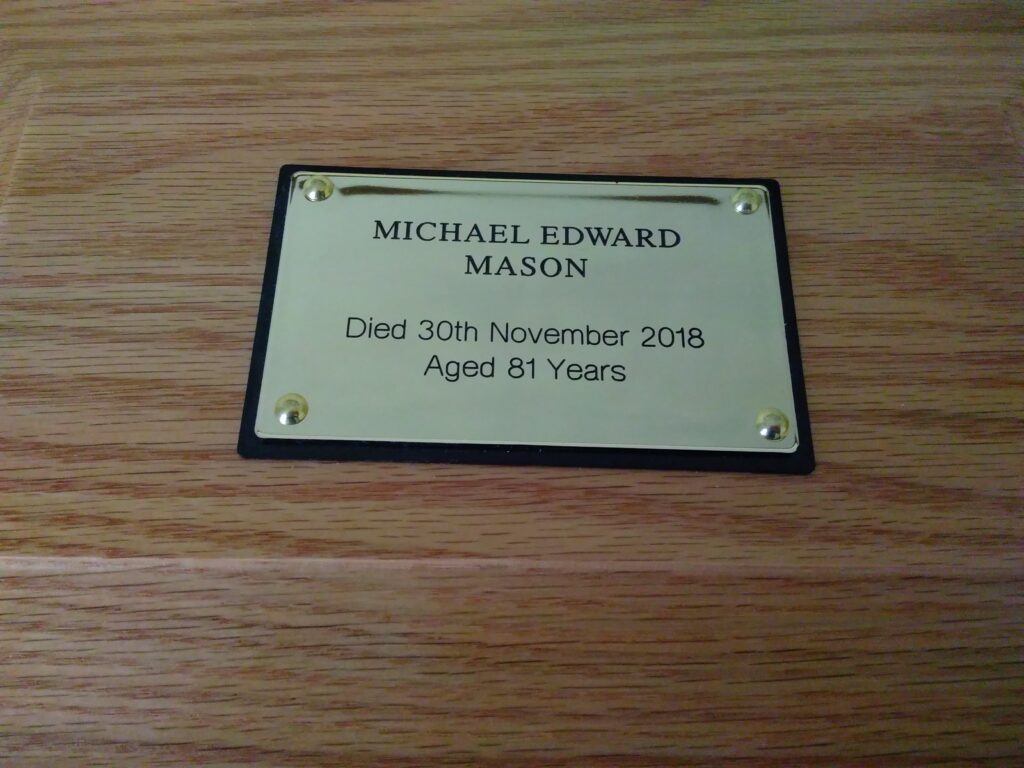
Monday came, and we drove out to Fornham in my mother’s car. It was a wet, cloudy day. There was just us, the two vicars, Revd. Edge’s wife, Teresa and her husband Allan. We had a short service, led by Canon Crawley, in the chapel to the side of the church. My father’s ashes, in a pine box with a brass name plate on the top, sat on the altar rail as Revd. Edge read a beautiful reading from Isaiah, which he had chosen.
On this mountain the Lord of hosts will make for all peoples a feast of rich food, a feast of well-aged wines, of rich food filled with marrow, of well-aged wines strained clear. And he will destroy on this mountain the shroud that is cast over all peoples, the sheet that is spread over all nations; he will swallow up death forever. Then the Lord God will wipe away the tears from all faces, and the disgrace of his people he will take away from all the earth, for the Lord has spoken. It will be said on that day, Lo, this is our God; we have waited for him, so that he might save us. This is the Lord for whom we have waited; let us be glad and rejoice in his salvation. Isaiah 25:6-9
Then, guided by Canon Crawley, I carried my father’s mortal remains outside, round the church, to a small plot beneath the east window. A hole had been dug, and lined with fake grass. After the familiar litany about ashes, I knelt down and placed the box into the hole, touched, but not overwhelmed, by a sense of the true awe of death. I was conscious of the sense of a performance and annoyed with myself for that. I forced myself to forget that there were people watching, and took care to make sure that the box was level, and square in the hole. My father, who liked his pencils lined up on his desk and his jackets hung in ordered rows in his wardrobe, would appreciate that. In that moment, I felt love for him, and I suddenly had tears in my eyes.
When I stood, Canon Crawley said, “Let us pray,” and we said the Lord’s Prayer. I had to keep wiping tears from my eyes, but I didn’t sob. When it was over, I kept staring down, into the hole, slightly horrified by what I had just done; the finality of it; trying to remember the promise of eternal life that Revd. Edge’s reading had so beautifully described. Someone was at my side, putting their arm around me, and I was moved beyond words to discover it was my mother. Charlotte and Amanda moved in close and we all held each other.
The grave is to the east of the church, beneath the window that depicts Christ the Redeemer. It will get morning sun, and it is large enough for my mother to join him there, when her time comes. Beside it, an old choir friend of my father’s is buried.
It is enough.
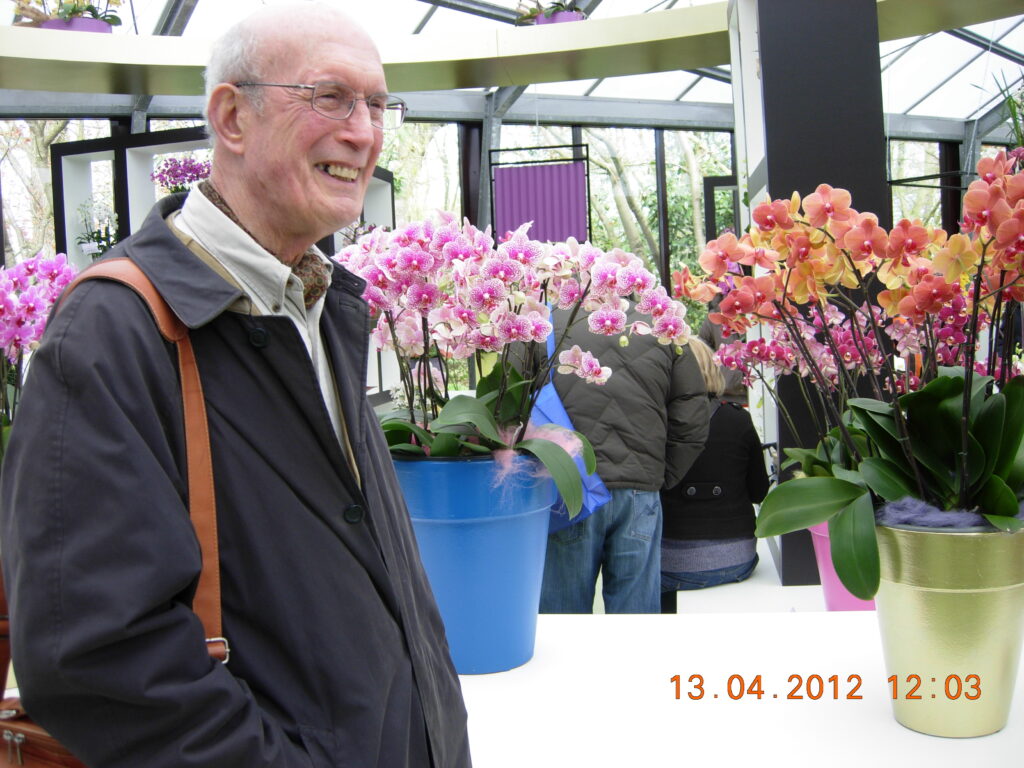

Leave a Reply
You must be logged in to post a comment.